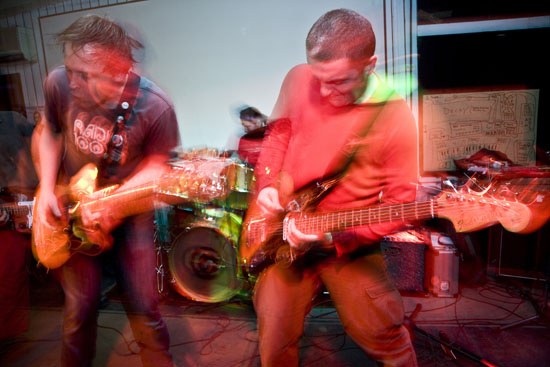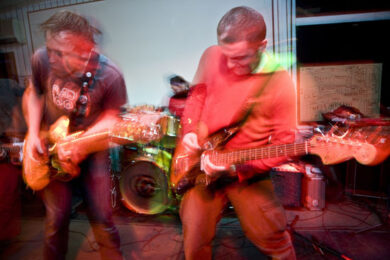The Ex are celebrating their thirty-three and a third birthday. For my part, it is ten years since I first saw the Dutch squat punks, at the All Tomorrow’s Parties festival at Camber Sands. Back then they were one of the highlights of an unusually strong festival line-up. In the meantime, they have been through a few changes, most significantly the departure of frighteningly intense lead vocalist, G.W. Sok, who left in 2008 after close to three decades with the group, in order to pursue solo projects, see other people, and write poetry. Sok has been replaced by Arnold de Boer, of Steward-esque noise pop outfit Zea. And while de Boer may lack his predecessor’s febrile vigour, he more than compensates with a certain guileless enthusiasm that is all his own.
Meanwhile, having lost long-term bassist Luc Klaasen after 2001’s acclaimed album, Dizzy Spells, and after a brief period of experimenting with a stand-up acoustic, the group now eschew bassists (although Andy Moor now favours a mid-range baritone guitar).
Finally, and perhaps most significantly for tonight’s show, over the past decade the group have begun a long-standing engagement with the music of Ethiopia. The group’s interest in the culture of the populous central African state has led to a series of tours in the country and numerous collaborations with local musicians. Tonight, they have brought some friends back with them.
The Ex are celebrating their thirty-three and a third birthday. They may be one of the last bands for whom the number means something concrete, something beyond quaint retro fetish. As owner-operators of their own record label (largely for the release of their own material and various collaborative projects), the band have been responsible for the pressing and distribution of several dozen slabs of vinyl intended to be spun on a turntable at thirty-three and a third revolutions per minute.
More than that, however, there is something about the group’s sound, and their approach to performance, that suits the very hands on, tactile nature of the LP format. Critics and even members of the band find it notoriously difficult to describe the musical genre which The Ex inhabit. But if the group can be meaningfully described as in some sense a ‘noise’ band, then theirs is distinctly a haptic noise.
Far from the spatialised, seemingly dynamic, mobile, almost visual kind of noise which extends equally from Stockhausen and GRM acousmaticians like Francois Bayle to contemporary 3D sound manipulators as diverse as Monolake and Chris Watson; equally distinct from the pungent, mustily olfactory noise of the various projects by James Kirby, whether under the moniker of The Caretaker or V/VM; the sound of The Ex calls forth to and seeks to engage with one’s sense of touch. Not only is their performance onstage at all times highly physical, but as listeners we find our physical sensations engaged. In seeking to describe the sounds we hear, we immediately reach for haptic descriptors: it is rough, textural, grainy.
Roland Barthes once spoke of the "grain of the voice" as a kind of "friction"; the appearance, as it were directly, of the "materiality of the body" in the voice as it sings, beyond any expressive or communicative register. You could speak of such an audible grain as manifest in every instrumental sound in The Ex’s growing orchestra. You hear, clearly, directly, unmediated, Andy Moor’s body in his guitar playing, Katrina Bornefeld’s body in her drumming.
Which is why it seems perfectly natural that a night like this would find guitarists Moor and Hessels forming a temporary trio with British free improv saxophonist, John Butcher. You cannot imagine the weightless, almost supernatural playing of Evan Parker working with The Ex. But Butcher’s playing is throaty, guttural. His saxophone becomes, in fact, an extension of his throat, infected with its own peculiar form of bronchitis; coughing and spluttering its honking multiphonics.
This is also why it seems perfectly natural that The Ex’s headline show would be preceded by a performance by an Ethiopian circus troupe, Debre Berhan. A basket is brought onto the stage, of the sort from which old Hollywood films have taught us to expect the emergence of a serpent, charmed by a reed flute. Instead, the basket becomes the occasion for the act of a contortionist, Abonesh Yilma, whose body would appear more improbably flexible than any snake. She is followed by jugglers, riding unicycles, throwing huge knives and clubs through the air. All this on a stage scarcely bigger – or more separate from the audience – than that at your local dive venue: the Bull & Gate, say, or Dublin Castle. Sheer proximity lent the performance a vertiginous sense of wonder, even danger.
And this is also why it seemed normal that The Ex’s touring birthday party should feature a performance by Addis Abeba-based musician, Zerfu Demissie. Stony-faced and dressed in a long sorcerer’s cloak, Demissie plays a ten-string harp called a begena which looks like its has been fashioned out of a large and ornate dining chair and sounds like the deep buzzing bass throb of a Moog synthesizer. When he sings, his voice begins in the conversational tones of a story-teller, developing an incantatory tone, almost menacing, with a note of imploring to some unknown other as it incorporates fleeting arabesques.
Normal, natural: sure. But nonetheless strange – and enchantingly so. Jean-Luc Nancy speaks of ‘touching’ as an encounter with the other which resists the temptation to efface the strangeness of the intrusion; a kind of physical incorporation that protests the predominant French (and increasingly British) ideology of assimilation. There is something of this kind of touching at work tonight. All of these incursions into a rock band’s third decade victory lap could easily have seemed out of place – even tokenistic – in the hands of almost any other rock band. But The Ex are not any other rock band, a fact more than confirmed by their crowning performance at the evening’s close.
Joined onstage by a horns section comprising some of the world’s finest, most celebrated living jazzers – Americans Ken Vandermark on baritone sax and Peter Evans on trumpet; Netherlanders Ab Baars on tenor sax and Wolter Wierbos on trombone – and more musicians and dancers from Ethiopia – members of the group, Fendika – The Ex deliver a set of such consuming physical joy that the entire audience is overcome, ecstatic.
The band that started off releasing shouty, three-chord punk chants with names like ‘Stupid Americans’ have evolved into something like a hyped-up swing-era big band with chronic tourettes; febrile, splenetic bursts of noise interrupting and somehow melting into the jiving, pulsing course of a seemingly unending stream of groovily infectious dance music. Dancers Melak Belay and Zenash Tsegayez leap and whirl like sufi dervishes, guitarists Moor and Hessels charging about the stage amongst them. The crowd is whipped into a mad frenzy. Songs last for ten minutes or more but always seem too short. The effect, finally, is something like Sun Ra’s Arkestra, stripped off its outer space mythology and played for fun, played for the sheer joy of playing and being together. A violent, ongoing collision that is at the same time an act of love.
The Ex are celebrating their thirty-three and a third birthday. Here’s wishing them many happy returns.



